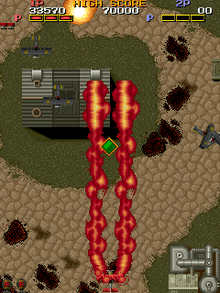Fire Shark
| Fire Shark | |
|---|---|
 European arcade flyer of Fire Shark. | |
| Developer(s) | Toaplan |
| Publisher(s) |
|
| Platform(s) | Arcade, Sega Mega Drive/Genesis |
| Release date(s) | ArcadeMega Drive/Sega Genesis |
| Genre(s) | Shoot 'em up |
| Mode(s) | 1 Player |
Fire Shark, originally released in Japan as Shark! Shark! Shark! (鮫! 鮫! 鮫! Same! Same! Same!), is a 1989 shoot 'em up arcade game developed and published by Toaplan. The player controls a biplane and builds up a score by shooting a variety of military targets.
It is considered the sequel to Flying Shark.
Plot
In the arcade version, one summer night in 1991, an enemy fleet known as the Strange Fleet approached a small island of the Mediterranean Sea. When it arrived, very few saw the Strange Fleet. Two years later, while the Stranger Fleet expanded itself, it created a world war. It is unknown by everyone around the world who noticed the attacks of the Strange Fleet. As the Strange Fleet continues their assault, many against them cried "Fire Shark! Fire Shark! It's time to take off!! Beat them for our sake. Go! Go! Fire Shark!"
In the Mega Drive/Sega Genesis port, in the year 19X9, on an alternate Earth, a global super-power known as the S Corps, which specializes in a heavy industrial army, begins invading various countries. All seems lost when a phantom pilot flying a super-powered biplane called the Fire Shark flies in to save the world from domination.
Gameplay

The mission is divided into ten stages, each possessing a different setting. Players must destroy every enemy that crosses their path between kamikaze enemy monoplanes and, land and sea vehicles. Like most vertical scrolling shooters, the player had no physical obstructions to face aside from the planes and zeppelins they all ready fought. Players can increase their bomb count, the speed via pick-ups. Players can hold up to ten bombs and can acquire extra lives from accumulating their score. The game has a checkpoint system that once a player dies, they have to restart at the closest checkpoint they passed. Once all ten stages are complete, the player is offered a chance to replay the game at a higher difficulty.
Ports and related releases
This game was later ported to the Mega Drive/Sega Genesis in 1990 by Toaplan in Japan and by Dreamworks in North America.
Reception
The Mega Drive version was well received when it was released, earning a rating of 8.25 in Electronic Gaming Monthly.[citation needed]